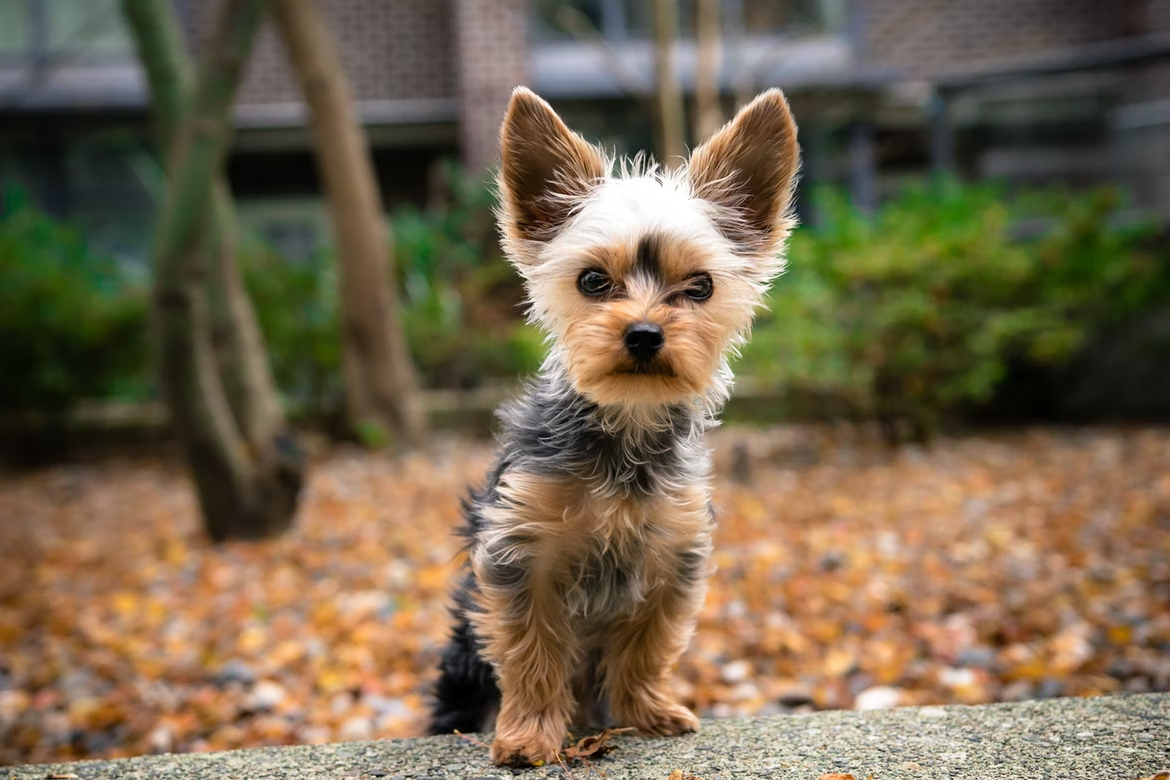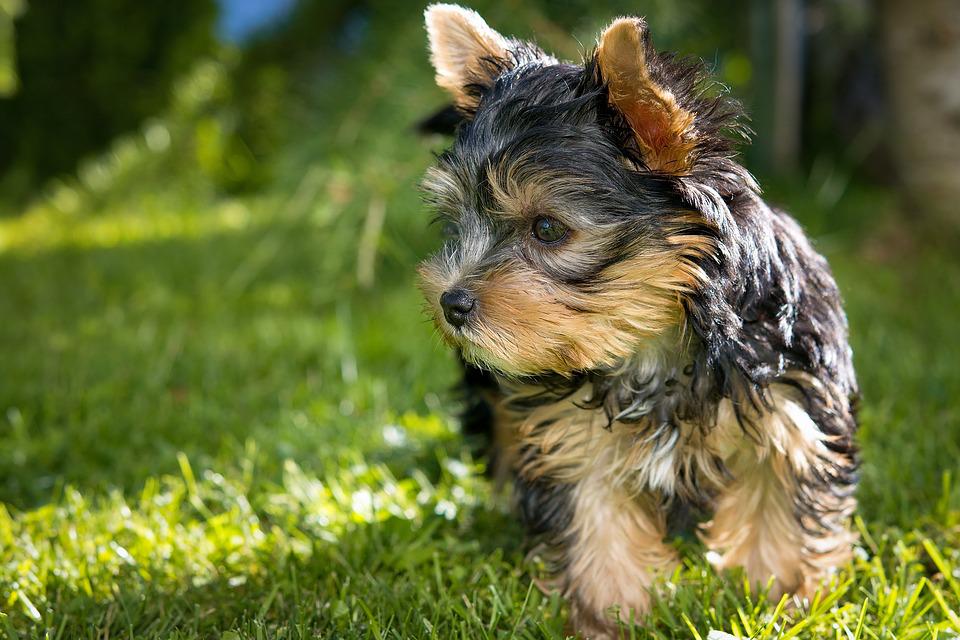Yorkshire Terrier
Yorkshire Terrier Expert Guide
Yorkshire Terriers, or Yorkies as more popularly known, are small dogs with enormous personalities. There's a lot to appreciate about these little lap dogs, including their affection, adventurous enthusiasm, and intellect. Small but bursting with personality, When their owners do not give them enough attention, Yorkies can become stubborn. Small but bursting with character.
Weight
- Male: 5 – 7 lbs
- Female: 4 – 6 lbs
Height
- Male: 8 – 9 inches
- Female: 7 – 8 inches
Lifespan
- 11-15 years
Appearance

Yorkies are one of the tiniest dog breeds, at only "7-9 tall" and weighing less than seven pounds as adults. They are recognized for appearing confident because of their high head carriage and compact, well-proportioned body structure. Yorkies have a low-slung, straight back, a petite head carried high on their shoulders and erect v-shaped ears. Their tails also rise tall.
Yorkshire Terriers are distinguished by their silky, straight, floor-length coat. Yorkie fur is semi-hypoallergenic since it resembles human hair. Their back hair is dark grey to black, and their limbs, chest, and face are a golden tan tint. Yorkies' coats are usually groomed to fall evenly on both sides of their bodies. They can also be shaved to make their hair shorter. Yorkie hair is often tied up with a ribbon when left long to keep it out of their eyes and contribute to their confident demeanor.
Temperament
Even though these dogs are fairly small, they don't notice it. Yorkies have authentic terrier temperaments and, as a result, a lion's heart. Yorkies are adventurous dogs. They'll pursue down anything that looks like a rodent, and they're noted for being strong climbers who can scale 4-foot-high chain-link fences. Despite their exquisite appearance, they are real terriers in every word.
Yorkshire Terriers are incredibly affectionate and dedicated to their human friends, and they enjoy spending many hours snuggling or playing with them. However, their behavior toward other dogs can be aggressive whether of their breed. Many terriers, including Yorkies, are territorial. They will fight tooth and nail to protect anything they consider their property. This predisposition fluctuates in strength from animal to animal, but it is a constant in the breed's temperament. Because of their territorial attitude, they bark more than other breeds.
Yorkshire Terriers may appear sweet, and believe us, they are, but your Yorkshire Terrier may try to boss you around due to their small stature. Socialization and training can help, and it's important to remember that Yorkie companion dogs desire your attention the most, so they may act out to gain it. This may result in some unpleasant yapping, but with consistent training, you'll be able to nurture a loving and sweet-natured dog.
Yorkshire Terriers make fantastic pets for adults and older children, but their physical vulnerability makes them unsuitable for small children who may hurt their pets.
Living Conditions

Yorkies are smart and flexible, and their small stature makes them ideal apartment dogs, but they also enjoy going out on the town. Their bold, adventure-seeking temperament allows them to thrive in urban settings. They dislike being left alone for lengthy periods and are susceptible to separation anxiety, which may necessitate additional training. If your Yorkie shows anxiety or discomfort while you're gone, get guidance from your veterinarian or hire an animal behaviorist.
While your Yorkie may like going on adventures with you, they are primarily inside dogs who do not take extreme heat or cold well. When it's cold outside, you might want to consider investing in a decent jacket to keep her warm. If you must take your Yorkie out on a hot day, make sure she has enough water. Remember that dogs do not sweat as humans do, so look for signs of heat exhaustion.
Yorkies want to be the center of attention and can become envious if another pet is introduced into the house. They can, however, get along with other pets if they are nurtured with them since puppyhood. According to the Yorkie Information Center, properly socializing your dog with other people and dogs will help him from being aggressive with strangers.
Care

Yorkies aren't simply for cuddling. This breed can be loud and obstinate at times. Early training and socialization with people and other dogs are crucial for the Yorkie's development and can help keep that huge personality in check. Grooming is also necessary to keep a Yorkie looking and feeling good.
And, if you want your Yorkshire terrier to look its best, its coat is sensitive and should be well cared for. Their silky coat is long and flowing with no undercoat, resulting in minimal shedding. The Yorkie requires more maintenance than other dog breeds, including brushing, bathing, trimming, and nail clipping.
Yorkies' fur grows quickly and can even obscure their eyes, so regular grooming in that area is necessary to keep their vision clear. If the fur is not brushed regularly, it can tangle easily; thus, a moisturizing shampoo followed by an oil-free conditioner should be used during bath time. Most Yorkie grooming may be done at home; however, taking them to a parlor every few months will dramatically improve their appearance.
Because the Yorkies' fur is so long, it easily collects dust and drags on the ground, attracting grime. Although a Yorkie's black coat makes dirt difficult to detect, the filth will become obvious quickly if they lie on white furniture or carpets.
Yorkies aren't generally hyper dogs, but they require enough exercise to burn off extra energy and avoid behavioral issues, just like any other terrier. Toy dogs get enough exercise just by running around the house and playing, but they also need to go for daily walks.
Walking provides much-needed mental stimulation, which can help stave off boredom and exercise. A regular walk around the block or two will keep your Yorkie in good physical and mental health, and you'll likely notice that your pet behaves better at home as well.
Health
- Yorkshire terriers can suffer from a variety of health conditions. While these may be common medical conditions, your Yorkshire terrier will not necessarily develop those listed below.
- Bladder stones are produced if excess minerals and other waste products solidify or crystallize in the dog's urinary bladder. The stones typically appear in dogs under six years of age and are often the result of portosystemic shunts in Yorkies. Just as in humans, bladder stones cause a great deal of pain for dogs who have them. A veterinarian requires immediate care to prevent severe infection and kidney failure complications. While bladder stones can reoccur, dietary modifications help reduce the incidence of recurrence.
- Congenital hydrocephalus is caused by congenital disabilities of the brain's drainage system and is not uncommon in the breed. Mild hydrocephalus, manifested by a dome-shaped skull with a pronounced "soft spot," does not cause serious clinical problems in many dogs. Severe hydrocephalus may cause depression, loss of coordinated movement, eye abnormalities, vision problems, seizures, and skull enlargement.
- Congenital patellar luxation is caused by anatomical defects of the bones that make up the knee joint. It is manifested by the kneecap (patella) slipping in and out of its normal location in the knee. Mildly affected dogs may carry the leg for 2 or 3 steps while walking. Severely affected dogs may become severely lame and refuse to use their rear legs. Surgical correction of this condition is very rewarding.
- Hypoglycemia happens when a Yorkie puppy's blood sugar is too low. This may be caused by a habitually long period between meals. Other environmental factors can exacerbate this condition, including stress, fatigue, cold environment, poor nutrition, bacterial infection, parasite, or portosystemic shunt. Immediate treatment is required because the condition can be fatal.
- Legg–Calvé–Perthes disease is caused by degeneration of the femoral head of the thigh bone due to poor circulation. The disorder typically appears when the Yorkie is young; signs include pain and lameness of the rear leg. Surgery is necessary to alleviate pain and the lameness associated with the disorder.
- A portosystemic shunt is a congenital malformation of the liver vasculature that results in blood bypassing the liver, where toxins and nutrients absorbed from the intestines are normally metabolized before entering circulation. The buildup of "toxins" in the unfiltered blood is responsible for the clinical signs of small stature, loss of appetite, inadequate muscle development, poor coordination, behavioral abnormalities, and seizures.
- Retinal dysplasia refers to the abnormal development of the retina. It may be due to an inherited defect or damage caused by a viral infection such as canine herpes virus or other viral disorders. The result is abnormal retina development, leading to poor vision and sometimes complete blindness.
- Tracheal collapse is caused by poor development and weakening of the trachea walls, becoming more severe with the dog's age. Since this condition is typically aggravated by a Yorkie pulling against his collar, it is recommended that a harness be used instead to prevent irritation and coughing. Chronic irritation and coughing may cause complications, including chronic lung disease and right-sided heart enlargement.
History
The Yorkshire Terrier's bravado comes from his forefathers, the long-extinct Clydesdale Terrier and the Black-and-Tan Terrier. Weavers from Scotland who moved to York, Manchester, and Leeds brought their terriers with them during hard times. The weavers eventually crossed their terriers with native dogs, resulting in the little yet tenacious terrier renowned today for its gleaming blue and gold cloak.
Yorkies proved to be excellent ratters in the English woolen mills, a trait they still possess. Breeders began to select the smaller size as they became more popular as companion dogs. Huddersfield Ben, the dog that is thought to be the father of the contemporary Yorkie, was born in 1865.
The dogs were first known as Broken Haired Scotch Terriers or Toy Terriers, but by 1870, they had been renamed Yorkshire Terriers, after the location where they were developed. It wasn't long before these rugged ratters became fashionable ladies' companions, and "fancy terriers" started showing up at dog shows.
Yorkshire Terriers arrived in the United States in 1872, swiftly becoming upper-class pets and even political symbols. Pasha, the Nixons' pet Yorkie, lived in the White House with them. The Yorkshire Terrier is ranked third among the American Kennel Club's certified breeds.
Final Thoughts
Overall, the Yorkshire terrier makes an excellent companion dog for families of all sizes, including multi-pet households with dogs and cats. The Yorkie appears to be a low-maintenance dog breed for food, training, and activity. However, their grooming needs are slightly more demanding, and you must be able to keep your Yorkie's fur in good condition to avoid overgrowth and tangles.
The Yorkshire terrier may be the right dog breed if you seek an affable breed that enjoys being around people.








Comments